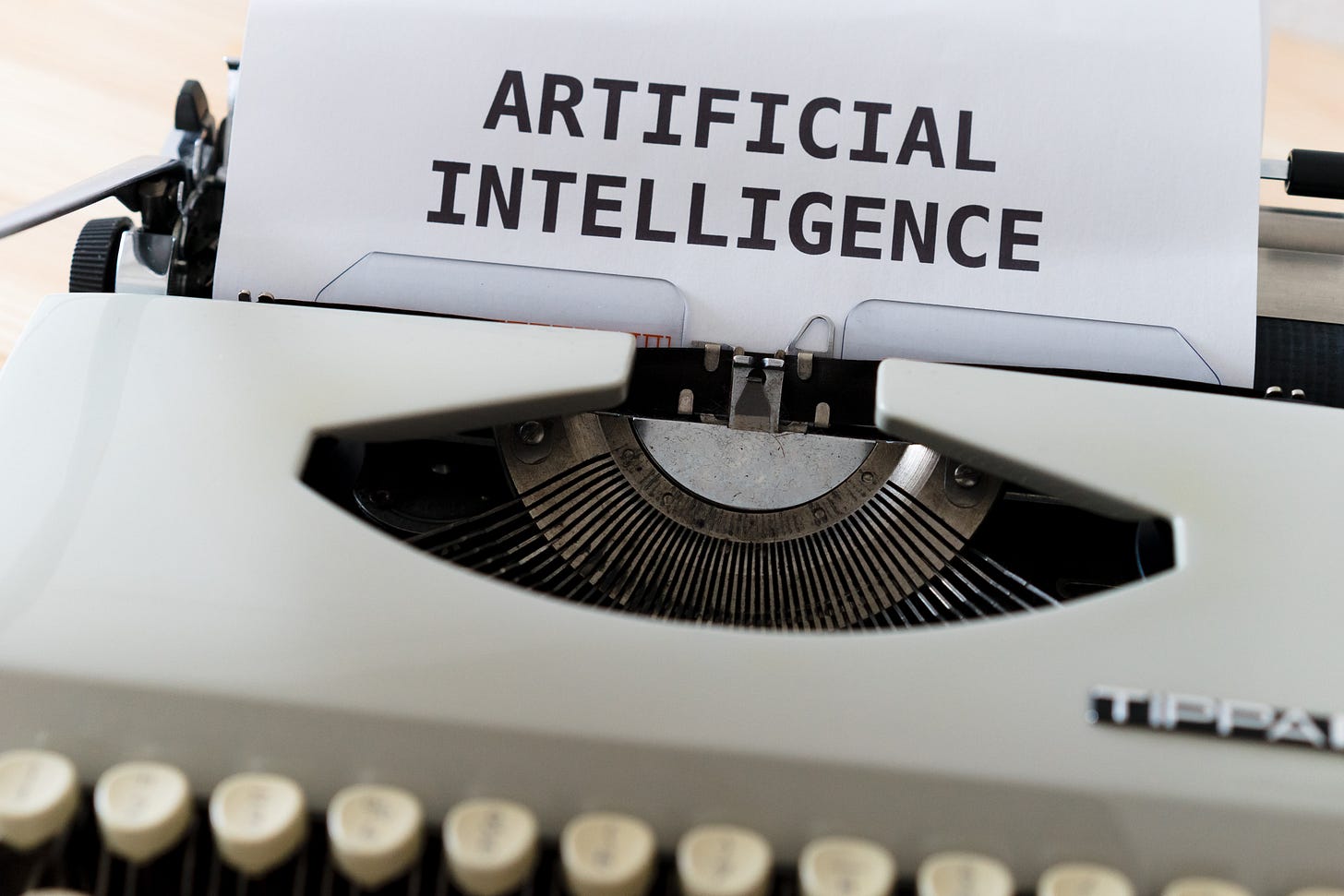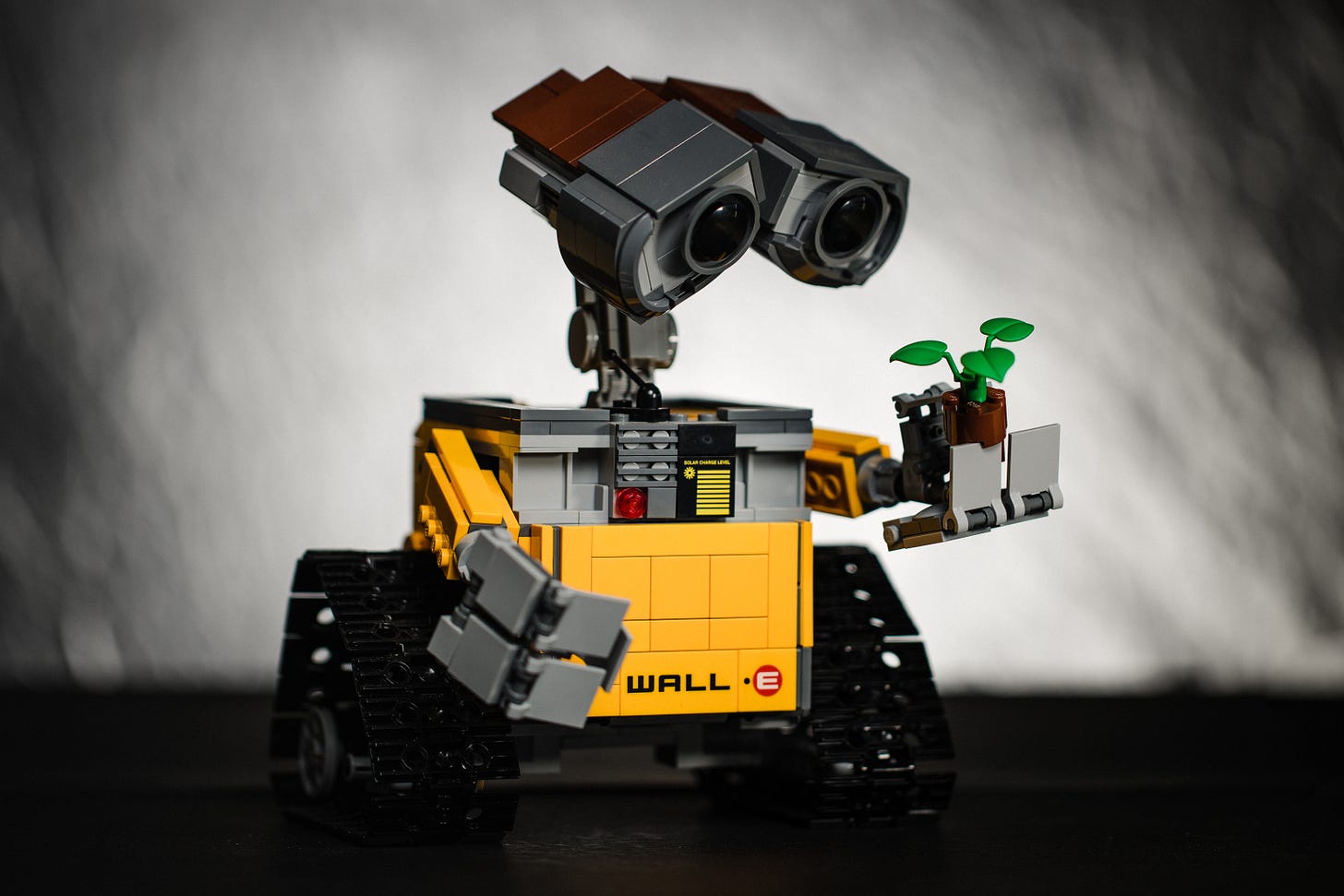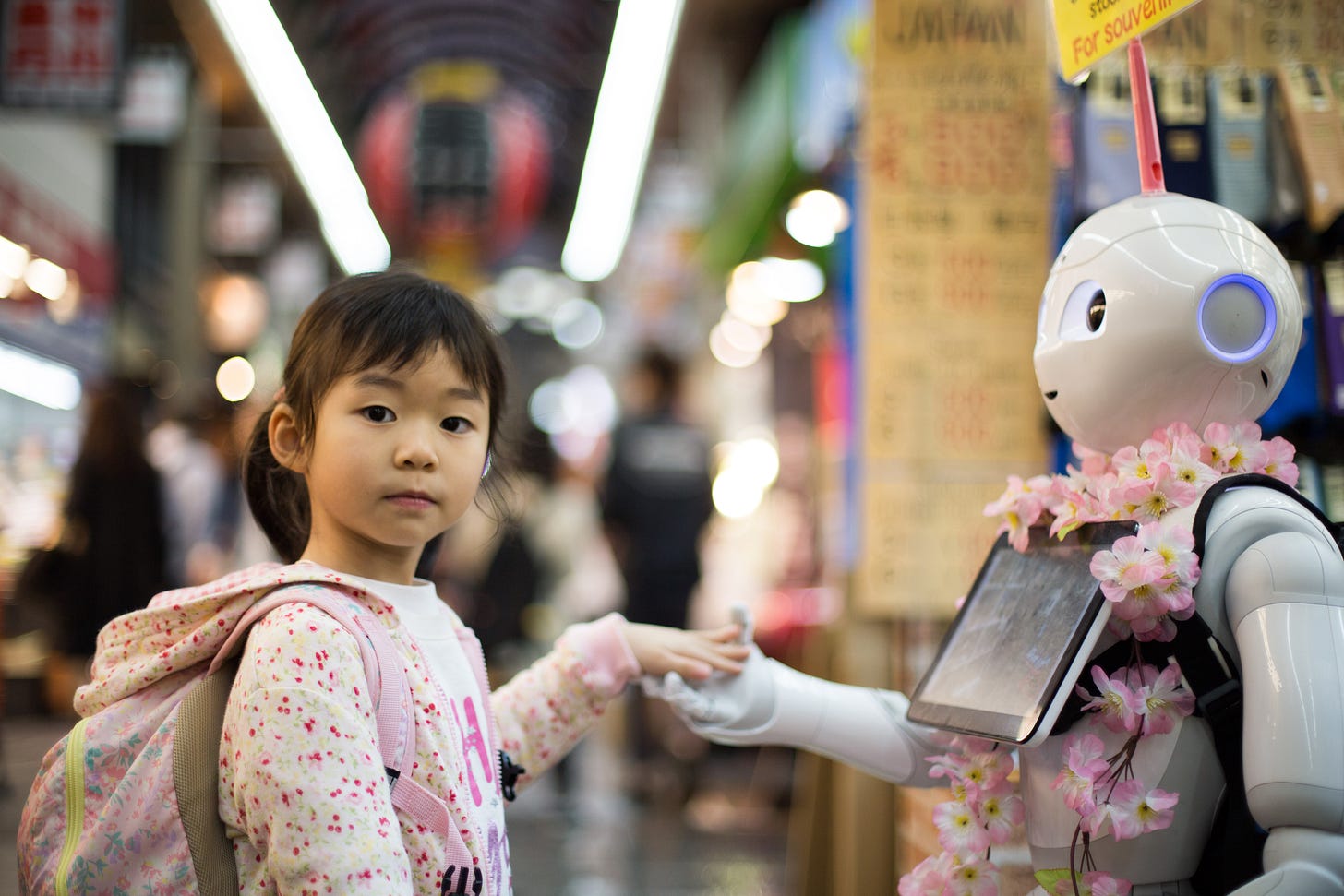Blade Runner 2022
If I was artificial intelligence, would I know it? And more on what it means to be human ... and a few words on the reversal of Roe.

A View
Welcome!
(Don’t worry - despite the title, you don’t have to know anything about the Blade Runner movies to fully experience this particular dispatch from The Embassy.)
Back when I was in college, typewriters were still around. (For younger readers, a typewriter is a mechanical device that prints letters on paper.) Relatively skilled typists could make a good amount of money typing papers for fellow students. A closely related student cottage industry was authoring papers or adapting previously authored papers for fellow students (in addition to typing them). In the pre-internet dark ages (which is all of history up to a handful of years ago), it was much harder to identify plagiarism.
In this computer age, it has become much easier to find plagiarism, you just search the entire internet for a full or partial match. In this dawning age of artificial intelligence (AI), that is growing harder, if not impossible. A student in a phycology class might have an assignment to represent the views of pop psychologist Scott Barry Kaufman on creativity - and that student might write something like:
I think creative expression is a natural byproduct of growing up in a diverse world. The more diverse the world is, the more you get exposed to different people, to different opportunities, to different places and to different challenges. And the more diverse that is, the more likely you’ll be to be able to put the dots together to form something new. And in many ways, I think if you want to be creative, you have to go for it. If you want to be a writer, you have to write, if you want to be a musician, you have to create music, if you want to be a comedian, you have to create comedy, and the more you create, the more likely it is that you’ll stumble onto some interesting stuff.
The paragraph above was written by a computer and represents the latest iteration in artificial intelligence - a universal language model known as GPT-3. Kaufman himself said “It definitely sounds like something I would say.” These models began with ‘chatbots’ which are fed a range of answers to likely customer questions and proceeded to the ‘auto-correct’ and ‘guess the next word’ algorithms you see on your phone or email. Those algorithms ‘learn’ what you are likely to say and suggest accordingly. These AI models have the entire internet as their source material and are able to “learn” and mimic the style of an author. Here is a hilarious site where GPT-3 is fed prompts in order to write poetry about Elon Musk in the style of Dr. Suess. It is easy to see how these computers can begin to sound more and more human.
That a computer might be ‘alive’ or ‘aware’ - the word used is sentient - was the concern of Blake Lemione, a Google engineer who was placed on leave last month after claiming that their AI system was ‘sentient’. Lemoine had conversed with this Google AI model many times and had expressed emotions and received what appeared to be emotionally laden responses. Lemoine was even trying to teach this computer to practice transcendental meditation.
For months, Mr. Lemoine had tussled with Google managers, executives and human resources over his surprising claim that the company’s Language Model for Dialogue Applications, or LaMDA, had consciousness and a soul. Google says hundreds of its researchers and engineers have conversed with LaMDA, an internal tool, and reached a different conclusion than Mr. Lemoine did. Most A.I. experts believe the industry is a very long way from computing sentience. (NYT)
These AI models will keep getting better and better. There are entire worlds of science fiction, including the Terminator franchise, where AI powered machines become self-aware and try to eliminate all humans so they can continue to ‘live’. That is also a recurring theme of Ridley Scott’s Alien and Blade Runner movies where replicants want to ‘live’ as humans. In some cases, they may even think themselves human or not be sure if they are human after all. Their machinery is so lifelike, they believe themselves to be something other than a machine, they think they are living as a human. But what does it mean for us to live as humans?

Behaviorists, such as B.F. Skinner, see humans as just highly developed biological ‘machines’ - like replicants, just the original version.
The real question is not whether machines think but whether men do. The mystery which surrounds a thinking machine already surrounds a thinking man.
B.F. Skinner, Contingencies of Reinforcement: A Theoretical Analysis (1969)
Lemoine appears to have been anthropomorphizing (assigning human characteristics to what isn’t) this AI model’s responses. We do the same to animated characters and probably our dogs and cats. It is understandable to interpret a response as if I were making it - and so seeing the response as evidence of sentience or self-awareness. Experts say this is an especially easy mistake to make with these AI models.
You can train it on vast amounts of written texts, including stories with emotion and pain and then it can finish that story in a manner that appears original … Not because it understands these feelings, but because it knows how to combine old sequences to create new ones.
Thomas Dietterich, Oregon State University
That this does not prove ‘sentience’ assumes that us actual humans do more than ‘combine old sequences to make new ones’. That being sentient, self-aware, human is more than a process of information and intellectual capability. That we are not simply machines. But what is sentience? What does it mean to be self-aware? Alive? We are back to a recurring question here at The Embassy - what does it mean to be human? In particular, for the point I want to make, what value is there in humanity that can’t be present in a machine? And how does that impact how we value other humans - other actual people around us?
Those of us who view humanity as much more than a very well developed thinking machine couldn’t mistake a computer for a human. Technologist and journalist (and Christian) Klon Kitchen writes:
… it is reasonable to suspect that AI will become more sophisticated. How we interpret these changes will likely depend on our epistemological worldview. My own presuppositions lead me to believe that a machine might become very intelligent, perhaps even generally more intelligent than a human being, but that it cannot become a sentient person.
I don’t know what it means for a machine to be intelligent, exactly, we use the term artificial intelligence to indicate a technology that appears to possess knowledge in some way that isn’t natural, it is artificial. It is different from ours. Regardless, I agree with Kitchen’s explanation of why this could never develop into full personhood:
One of my core presuppositions is that every human uniquely bears the “image” of the Creator and that this confers an intrinsic value undiminished by age, sickness, deformity, or any other variable. While this image is not wholly captured by our intelligence or our self-awareness, it is reflected in both.
This is a traditional Judeo-Christian view - we are more than just thinking machines, we are humans. We are not simply ‘developed’, we have been created - and we bear the image of our creator. That is the origin of our story and the basis of our value as humans.

In 2017, Iceland revealed that it had almost eradicated Down’s Syndrome in that country through prenatal testing and abortion of those who tested positive. They had solved the problem of Down’s Syndrome by eliminating it wherever they could find it. We could write a different post discussing the method of elimination (and given recent events, we may well), but my first question would be - in what sense is this a problem? Certainly, there are life-altering consequences of having a Down’s Syndrome child and I don’t wat to say there are no problems in raising one. But many children bring unforeseen life-altering consequences, maybe all of them. There are problems in raising Down’s Syndrome children, but is there a problem in being one?
If sentience involves more than thinking, if it involves love and joy and beauty and kindness, a computer wouldn’t be confused with humanity. In the Blade Runner movies, who is a human and how human are the ‘almost human’ replicants is the question - and do the ‘almost humans’ know they aren’t human? The question for each of us to ponder today is how easy it is for us to assign ourselves a machine-like value based on thinking or production or appearance or popularity. And to repeat that process for others. Will others see actual humanity in me? If we bear the image of our Creator, we bear the image of his intelligence, but also much more than that.
Dear friends, let us love one another, for love comes from God. Everyone who loves has been born of God and knows God. Whoever does not love does not know God, because God is love. This is how God showed his love among us: He sent his one and only Son into the world that we might live through him. This is love: not that we loved God, but that he loved us and sent his Son as an atoning sacrifice for our sins. Dear friends, since God so loved us, we also ought to love one another. No one has ever seen God; but if we love one another, God lives in us and his love is made complete in us.
1 John 4:7-12
If humanity is more than thinking, if it is love and joy and beauty and kindness and happiness, some with Down’s Syndrome might ‘outhuman’ many of the rest of us. And while a computer model might be trained to complete the biblical paragraph above, it cannot be trained to love us. That ability comes from our creator, not the computer’s.
This is how I know I am not a replicant or an AI model. This is how I know I am more than a thinking machine, indistinguishable from other thinking machines apart from a different set of inputs. I know it because God tells me otherwise. I know it by faith. I’m not sure there is another way to know it.
And, here at the end of this dispatch - finally, a word on the reversal of Roe, just a word, there are certainly more. But I believe, along with centuries of Christians before me, that human life is a gift from God that we do not own. I believe that suicide, for example, is not an option for me because it is the taking of something that I do not own. The image of God is uniquely carried in each person in some way. I believe that image is present in some form at some point in the womb, because the Bible seems to indicate this in a number of places and a number of ways. That is the background for my understandings of humans - not just that the taking of a life or the dishonoring of a life is a defacing of the image of God, but that all of us, even the most ignored and dishonored among us, have the dignity of bearing God’s image. All have dignity, all deserve honor, all should be cared for. That is one reason we are to love one another and honor one another and bear one another’s burdens. As Jesus said, when we care for the least among us, we care for him in a way that is both mysterious and extremely practical. Dear friends, let us love one another, for love comes from God.
Love to all.
If you’d like to support my work, access more content, and engage with me and other subscribers here, you can subscribe to The Embassy using the button below.
You will have access to essays, conversation threads, Q & A, and all the archives. If you have a question about anything, ask it by sending me an email at theembassy@substack.com
(I believe in paying for content where I can in order to encourage more of it. I have paid subscriptions to some publications in order to encourage them and more like them in this difficult media landscape we are in. But I also know that some people want to do that and can’t. This is why The Embassy offers free subscriptions to those who want all the content and want to engage with me and other subscribers, but can’t afford it (at least right now). If that is you, please email theembassy@substack.com for a free subscription to The Embassy)
Links -
Some of these are paywalled but are referenced above.
Google Sidelines Engineer Who Claims Its AI Is Sentient (New York Times)
Has Google AI Become Sentient? (Klon Kitchen - The Dispatch)
Meet GPT-3. It has learned to code (and blog and argue). (New York Times)
The real Down syndrome problem: Accepting genocide (The Washington Post)
In case you are curious about the Blade Runner movies:
Here is a brief description of the ending of the original Blade Runner that give you a feel for the movie.
Here is a (spoiler filled) explainer for Blade Runner 2049 that explores the themes of both movies.



